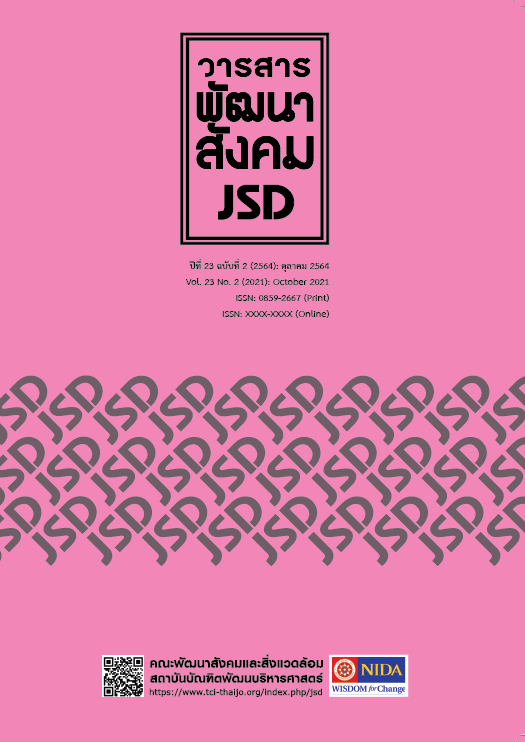Psychological Characteristics and Situational Factors as Correlates of Online Learning Preparation Behavior of Undergraduate Students
Main Article Content
Abstract
Article Details
References
Bhanthumnavin, D. (2000). Importance of Supervisory Social Support and its Implication for HRD in Thailand. Psychology and Developing Societies. 12(2), 155-166.
Bhanthumnavin, D. (2004). How can leader develop future orientation and self-control of followers? The article of seminar on "Thai behavioral research system solve the problem and develop youth". (In Thai). Bangkok: National Research Council of Thailand and the National Commission for Research and Development of Thai Behavioral Systems.
Bhanthumnavin, D. (2013). Antecedents and consequences of mindful risk-taking behavior in secondary school students (Complete research report). (In Thai). Bangkok: National Research Council of Thailand.
Bhanthumnavin, D. (2014). Multi-dimensional test construction of readiness and potential to become researchers in different types of individuals. (In Thai). Research program multi-causal factor of readiness and potential to become researcher in university students and Thai scholars (Complete research report). Bangkok: National Institute of Development Administration.
Bhanthumnavin, D., & Bhanthumnavin, D. (1998). Theory of measurement and research of ego identity in Thai and abroad (Research report). (In Thai). Bangkok: National Institute of Development Administration. Social Development.
Boualar, K. (2018). Psychological Characteristics and Situational Factors as Correlates of Absorption-Study Behavior ofthe First-Generation University Students. (In Thai). Journal of Behavioral Science for Development, 10(2), 56-82.
Chairak, S. (2008). Drinking behavior of Suranaree University of Technology students in academic year 2008. (In Thai). Suranaree University of Technology Intellectual Repository. Retrieved from http://sutir.sut.ac.th:8080/jspui/handle/123456789/3314
Chopik, W. J., O’Brien, E., & Konrath, S. H. (2017). Differences in empathic concern and perspective taking across 63 countries. Journal of Cross-Cultural Psychology, 48(1), 23-38.
Choy, S. P. (2001). Students Whose Parents Did Not Go to College: Postsecondary Access, Persistence, and Attainment. The Condition of Education. Retrieved from https://doi.org/10.1177/08920206010150030701
Cohen, J. (1977). Statistical power analysis for the behavioral sciences. (rev. ed.). New York: Academic Press.
D'Agostino, R. B., & Cureton, E. E. (1975). The 27 percent rule revisited. Educational and Psychological Measurement, 35(1), 47-50.
De Leeuw, A., Valois, P., Ajzen, I., & Schmidt, P. (2015). Using the theory of planned behavior to identify key beliefs underlying pro-environmental behavior in high-school students: Implications for educational interventions. Journal of Environmental Psychology, (42), 128-138.
Duanginta, Y. (2006). Research-Based Construction of Future Orientation Self Control Measure for College Students (master’s thesis). (In Thai). National Institute of Development Administration. Social Development, Bangkok.
Inthason, S. (2020). COVID - 19 and Online Teaching case study: Web Programming Course. (In Thai). Journal of Management Science Review. 22(2), 203-214. Retrieved from https://so03.tci-thaijo.org/index.php/msaru/article/view/244722/167805
Jhermpun, S. (2002). Psychological and Situational Factors Correlates of Secondary School Students in Mathematics Learning Behavior. (In Thai). Bangkok: National Institute of Development Administration. Retrieved from https://doi.nrct.go.th/ListDoi/listDetail?Resolve_DOI=10.14457/NIDA.the.2002.222
Kaewpaitoon, A. & Prombut, P. (2020). Study on Learning Behavior of Children and Youth according to Reduce Study Time, Increase Knowledge Time Policy. (In Thai). The Journal of Research and Academics, 3(3), 55-68. Retrieved from https://doi.org/10.14456/jra.2020.5
Magnusson, D., & Endler, N. S. (1977). Personaliity at the crossroads: Current issues in interactionism psychology. New Jersey: LEA Publishers.
Muangkhot, S. (2018). Antecedents and Consequences of Participative Behavior Relatedto Corporate Social Responsibility Projects of Ground Staffs in Thai Airways International. (In Thai). Journal of Behavioral Science for Development, 10(2), 162-182.
Numniem, S. & Panthongkhum, N. (2003). Factors Related to the Behavior of Financial Discipline of Undergraduate Students, Kasetsart University, Kamphaeng Sean Campus. (In Thai). Veridian E-Journal, Silpakorn University, 9(2), 1890-1900. Retrieved from https://he02.tci-thaijo.org/index.php/Veridian-E-Journal/article/view/72496
Prasertla, J. (2014). Psychological and Situational Factors Related to the Behaviors of Continuing Education Preparation in Public Among Students who belong to Department of Education Bangkok Metropolitan Administrator. (In Thai). UMT Poly Journal, 11(2), 11-16. Retrieved from https://so06.tci-thaijo.org/index.php/umtpoly/search/authors/view?givenName=%E0
Ratchasombat, U., & Noinart, C. (2011). Impact of Learning Behavior and Attitude on Learning Achievement in Basic Statistics of Student in Faculty of Commerce and Management. (In Thai). Songkhla: Prince of Songskla University. Retrieved from http://kb.psu.ac.th/psukb/handle/2010/8649
Sakdapat, N., & Bhanthumnavin, D. (2020). Integration of Psychosocial Factors as Correlates to Critical Thinking Ability in Graduate Students. (In Thai). Dusit Thani College Journal, 14(1), 389-403.
Sukin, V. (2008) The Effects of Psychological Characteristics and Working Situations on Effective Teaching Behavior of Engineering Lecturers. (In Thai). Warasan Phuettikammasat, 14(1), 1-20.
Suwannatthachote, P. (2011). Online Instructor Competencies and Roles: Instructor Presence and Learner Support. (In Thai). Journal of Graduate Studies Valaya Alongkron Rajabhat University, 12(2), 244-256. Retrieved from https://so02.tcithaijo.org/index.php/JournalGradVRU/article/view/137155
Techaniyom, K. (2021). A Comparison of Psychological Characteristics of University Students and Causal Relationship of Factors to Affect Online Gaming on Smartphones Behavior in Thailand. (In Thai). Journal of Social Development, 23(1), 30-48.
Thorndike, E. L. (1898). Animal intelligence: An experimental study of the associative processes in animals. The Psychological Review: Monograph Supplements, 2(4), i–109. Retrieved from https://doi.org/10.1037/h0092987
Warinsook, Pranee, & Hombubpha (2014). Environmental Factors in Schools Affecting Public Mind Behaviors of Prathomsuksa Six Students Under the Nakhon Sawan Primary Educational Service Area Office. (In Thai). Journal of Graduate Studies in Northern Rajabhat Universities, 4(6), 85-100.
Yokchoo, K. (2010). Factors Affecting on Readiness in GAT (General Aptitude Test) and PAT (Professional Aptitude Test) Examination of Muthayomsukda VI Student At Triamudomsuksapattanakan Ratchada School, Huaykhwang District, Bangkok. (In Thai). (Master’s thesis). Retrieved from http://ir.swu.ac.th/jspui/handle/123456789/917


